Kerameikos: An Oasis in the Ancient City
The Kerameikos archaeological site provides a...
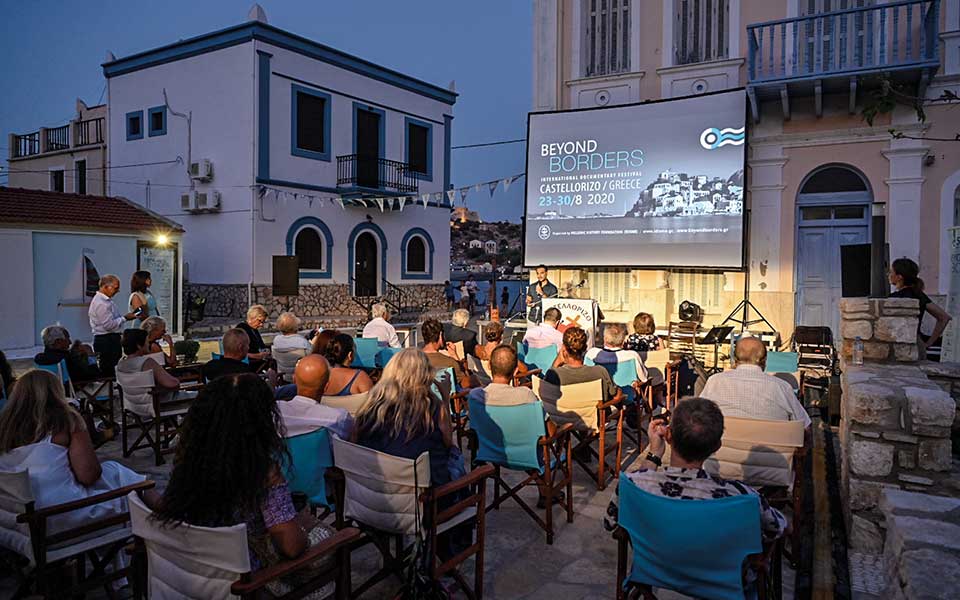
Screening night in the town square.
© Christos Simatos
When historian Irini Sarioglou, a true Istanbulite and a proud graduate of the Zappeion School for Girls, first visited Kastellorizo in 1991 on vacation – “with my parents, my brother, our dog and my guitar” – the island was a lot different than it is today. The ruins of the 20th century, which was so ruthless to the island for its most part, were everywhere. The glory days of a thriving society that was regarded as the mirror-image of Smyrna, with 10,000 residents and 3,000 students at the Santrape School, were nothing but a distant memory. Tourism was negligible and there were just three tavernas – “though the owners looked after their customers as though they were guests in their own home.” And not even the Oscar-winning film “Mediterraneo” had been made yet, to stir some interest in the far-flung island on Greece’s easternmost border.
The years went by and Sarioglou’s personal and professional bond with the island deepened as she experienced it in joy and sadness, and studied it in depth. As general secretary of the Hellenic History Foundation (HHF), she has overseen publications, exhibitions, documentaries and the Beyond Borders International Documentary Festival of Kastellorizo. The last is the highlight of the island’s cultural calendar, a celebration of culture, history and cinema whose fame has now traveled beyond Greece’s borders.
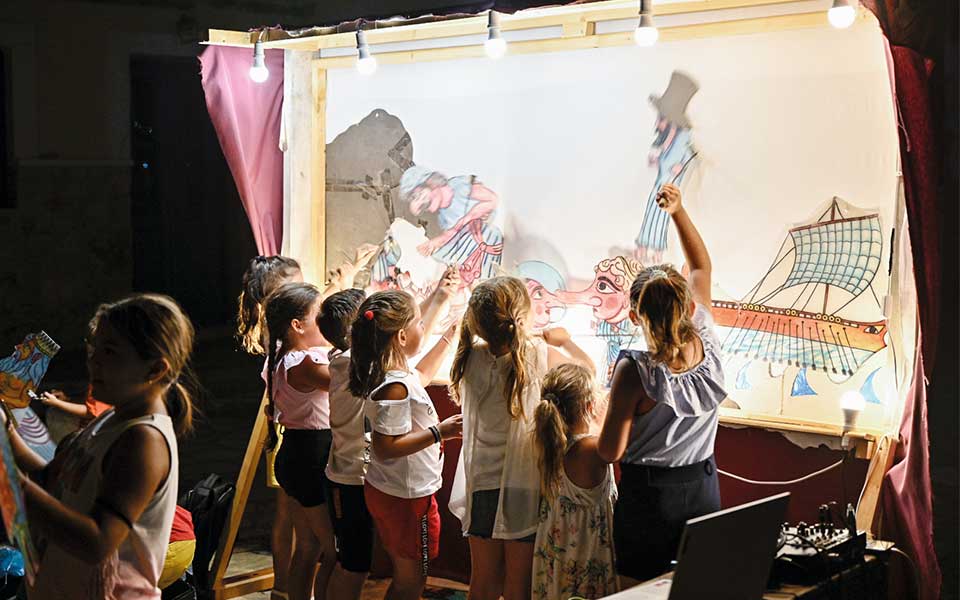
Alexandros Melissinos’ shadow theater was a big hit with the young crowd.
© Christos Simatos
“It all started five years ago. HHF had published the historical album ‘On the Edge of the Aegean: Castellorizo, 1890-1948,’ by Greek-Australians Nikos Papanastasiou and Nikos Vogiatzis, and released a documentary of the same name that we directed with Angelos Kovotsos, which actually went on to win the prize for most creative documentary at the 2016 International Film and Documentary Festival in London,” says Sarioglou.
“Having the film screened in Kastellorizo, an island with a vital role in the history of Hellenism, was much more than a desire – it was a duty. Along the way, we had the idea of not settling for a single screening, but to establish a festival that would help the island claim the place it deserves on the cultural map.”
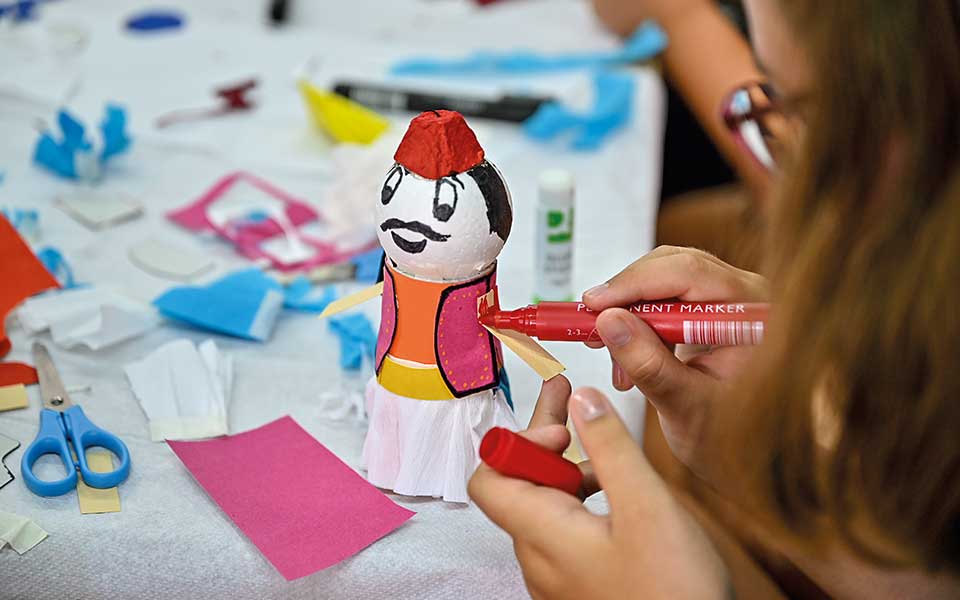
The National Historical Museum brings its own special touch to the festival, offering workshops for children.
© Christos Simatos
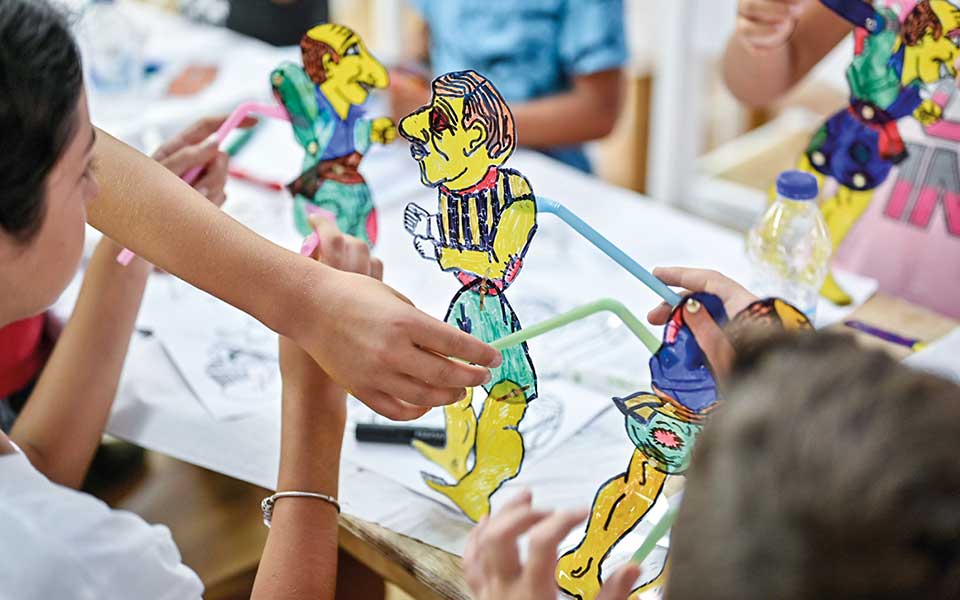
Learning the art of puppet-making for shadow theater.
© Christos Simatos
With its rich and tumultuous history, Kastellorizo itself ultimately defines the character of the Beyond Borders festival, and the documentaries that are selected are mostly of a historical nature. “They may be about the history of a minority group, of an individual or of a war. They address seminal events and people who have had an influence on countries, people and cultures all over the world, always along the themes of history and society,” explains Sarioglou.
Every year, the selection committee must choose 24 films from 18 countries, “and believe me, the quality is so high that this is one committee I would honestly like to not be on,” says Sarioglou.
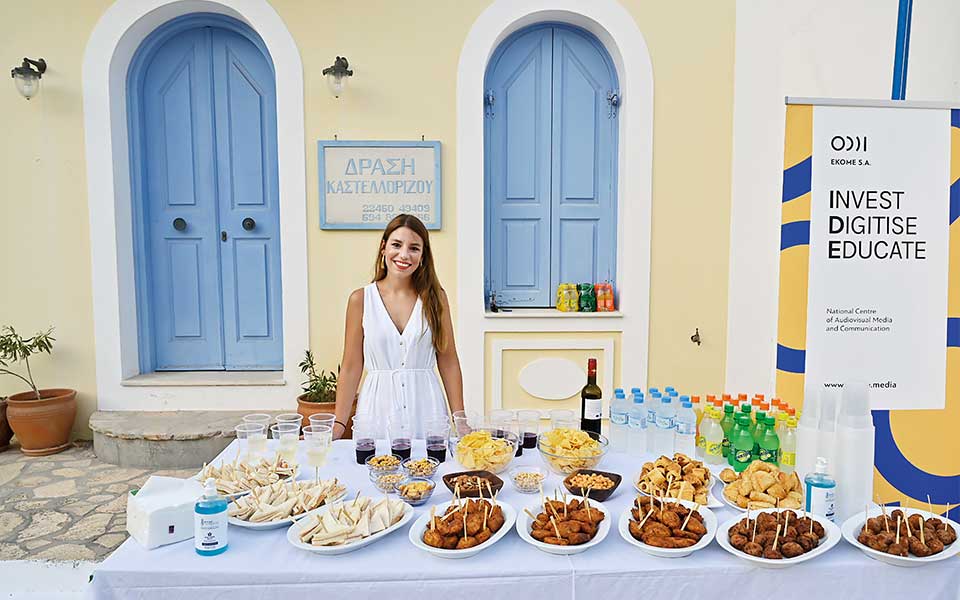
Maria Iliadis, a member of the organizing committee.
© Christos Simatos
“Even this year, in the wake of the lockdown and the isolation, we had 304 entries from 50 countries. We must have been among the few festivals in Europe that did not just go ahead, but actually enriched their program. Apart from the awards for Best Historical and Best Sociopolitical documentaries, both backed by the Greek Parliament, and the Special Award for Mediterranean Friendship, sponsored by the National Center of Audiovisual Media and Communication, we also added an award for Best Short Documentary, another for Best Greek Documentary – sponsored by the Aristotle University of Thessaloniki and the Greek Film Center – and the Odysseus Special Award, which is supported by the General Secretariat for Greeks Abroad and is awarded to a Greek filmmaker who is based overseas.”
The festival was warmly received from the very beginning and film buffs traveled from all over the world to the beautiful island, alongside important directors, historians and archaeologists. Even this past summer, when the pandemic and tensions with Turkey cast doubt over participations until the very last minute, the festival was carried out under the auspices of the embassies of the United States, Australia and Israel.
“We were particularly happy to welcome the ambassadors to our island.”
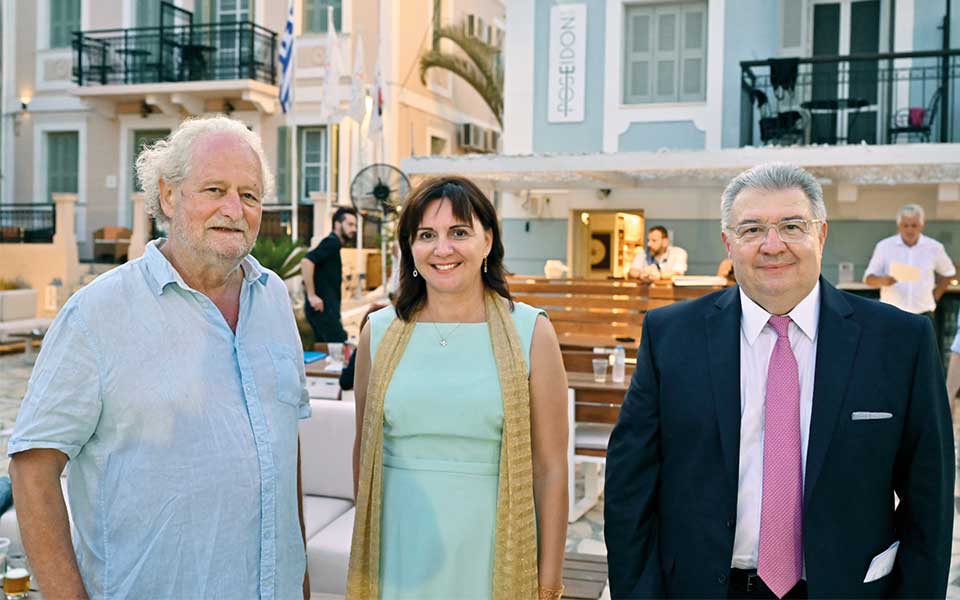
The Secretary General for Public Diplomacy and Greeks Abroad John Chrysoulakis (right) with the festival’s founder Irini Sarioglou and co-organizer Michel Fais.
© Christos Simatos
The response from the local community – young and old alike – has been just as important. This has been helped by the program of parallel events, which is constantly being enriched with discussion panels, educational activities for the island’s children, concerts, photography and sculpture exhibitions, scuba diving lessons, shadow puppet theater, and so on.
“We brought professional theater back to the island after an absence of 110 years,” says Sarioglou. Are there any particular moments that unfolded “behind the scenes” that were particularly moving on this journey? “I will always remember this local kid called Nikolis. It must have been toward the end of the festival’s third edition when he came up to me, excited to announce that he had decided what he wanted to be when he grew up. He wanted to be a historian! When I asked him why in surprise, he answered straightaway: ‘So I can organize documentary festivals!’”
Preparations for the next festival begin as soon as the previous one ends. It is a 12-month process that takes an enormous amount of energy and dedication – but mostly love. “You can never achieve success without endless, boundless love for what you do! Our vision is for Kastellorizo to once more become an intellectual hub where the discipline of history will come together not just with documentary film but with other aspects of culture as well.”
Beyond Borders through the eyes of three filmmakers who took part in its 2020 edition.
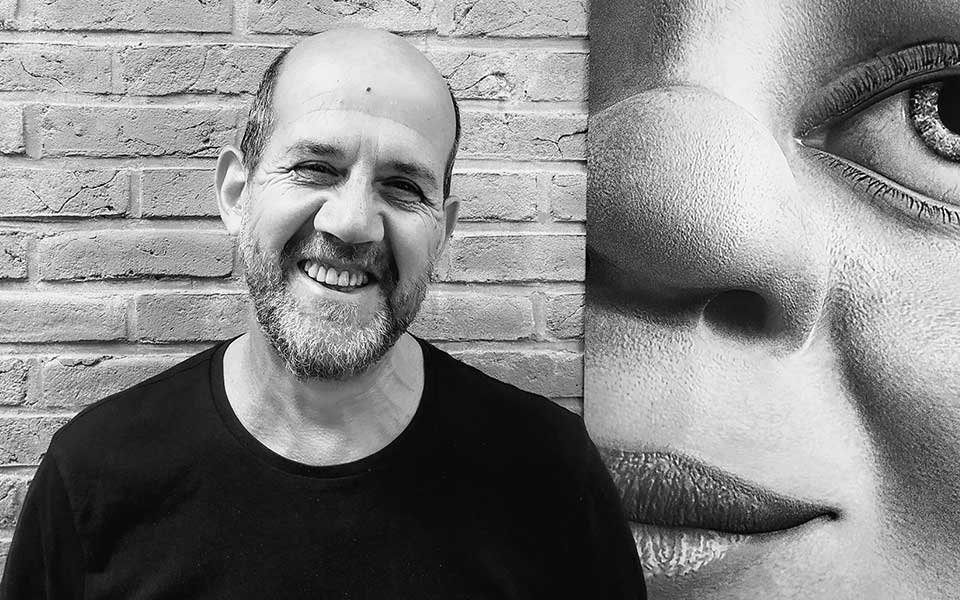
Dimitris Kafidas
Dimitris Kafidas
Best Greek Documentary, courtesy of the Aristotle University of Thessaloniki, for “Spiros and the Circle of Death” (Greece-Belgium, 2020, 56 mins), directed by Dimitris Kafidas and Lino Kafidas.
“I had never been to Kastellorizo, but nothing could have stopped me from going now, not even Turkish frigates! Our film ‘Spiros and the Circle of Death’ was selected for the Beyond Borders International Documentary Festival and it was an opportunity we simply couldn’t pass up! If I had to describe the festival in a single word, it would be ‘charming.’ It’s a warm, friendly and small festival, but also extremely well-organized with great parallel events and panels. It’s on track to becoming an important name on the festival circuit in a few years’ time. The island, meanwhile, is colorful, picturesque and so small that it takes just two days to get to know everyone by their first name. Kiko, the man who owns the taverna at Ai-Giorgis, pointed across the sea to Kas in Turkey and talked to us about how much he missed his Turkish friends. Exclusive economic zones mean nothing in friendships and human relationships.”
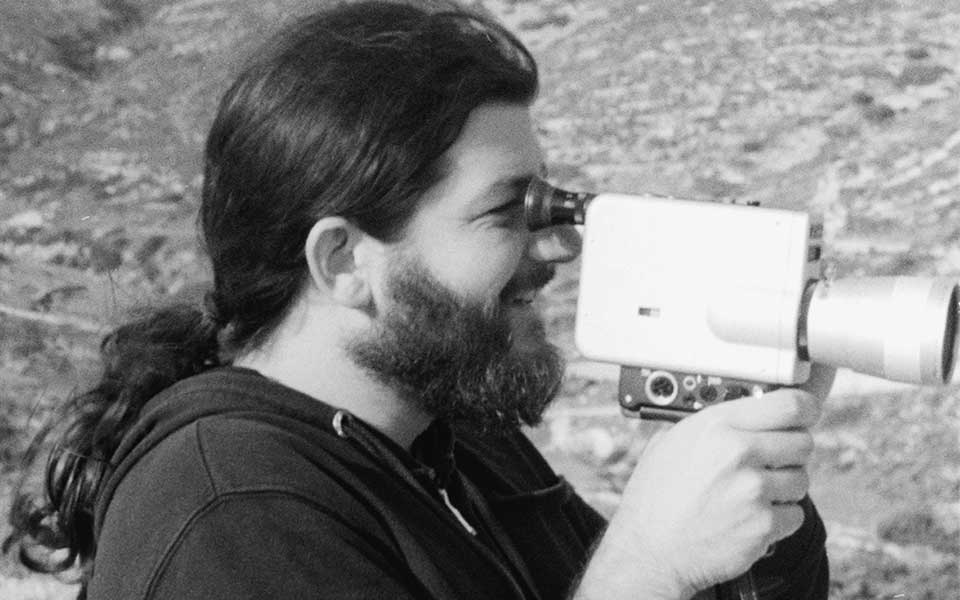
Yiannis Kolozis
Yiannis Kolozis
Special Mention for “Yiorgos of Kedros” (Greece, 2020, 82 mins), directed by Yiannis Kolozis and Giorgos Kolozis.
“It was almost dark as the ship sailed into Kastellorizo. The closer we got to the island, the nearer it seemed to the Turkish coast. Borders, after all, are a human invention and soon collapse in the face of the reality. All I saw was sea and land, and then light and people. People who are just like the people across the sea: at times confident, at others racked with insecurity. Just like the people I saw featured in the documentaries of the festival: from the Roma people of the Balkans to the Aborigines of Australia. In the few days I spent on this faraway island, I was reminded of why I make documentaries, the process, embracing ignorance and going forward together.”

Thodoris Chondrogiannos
Thodoris Chondrogiannos
Special Award for Mediterranean Friendship, courtesy of the National Center of Audiovisual Media and Communication–EKOME, for “Silent Fish” (Greece, 2020, 70 mins), directed by Andreas Loukakos and Thodoris Chondrogiannos.
“‘Silent Fish’ addresses overfishing in the Mediterranean and how it empties the sea of stocks and threatens the livelihoods of fishermen in the age of climate change. It was shot in fishing grounds in different countries around the Mediterranean, so its voyage to Kastellorizo is especially symbolic – to a fishing ground that also constitutes the edge of Greece but also of Europe. It was touching that – despite the pandemic – we were able to share our film’s screening in person with the people of this island, who ought to be remembered and honored with cultural events right here. I was also overjoyed by the film receiving the Mediterranean Friendship Award, as one of our objectives was to highlight the shared roots and common problems of the Mediterranean people who have more things uniting than dividing them. It is one of culture’s roles to remind us of such things in times like these.”
Beyond Borders is organized by the Hellenic History Foundation, together with Ecrans des Mondes in Paris and the Society for the Restoration of Megisti Castellorizo in Sydney, Australia. It is held under the auspices of the Foreign Ministry’s General Secretariat for Greeks Abroad, the Ministry of Culture and Sports, the Municipality of Megisti and the embassies of Australia, Israel and the United States, with the support of the Greek Parliament, the General Secretariat for the Aegean and Island Policy, the Culture Ministry’s General Secretariat for Overseas Greeks, the national broadcaster ERT and the National Center for Audiovisual Media and Communication.
The Kerameikos archaeological site provides a...
Discover how ancient Greek architecture inspired...
Ten must-do experiences in Athens, from...
Discover Greece’s islands in September with...